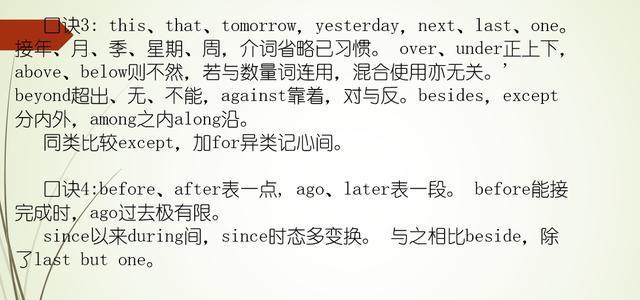比较介词在英语中用于比较两个事物的差异或相似之处。常见的比较介词包括"than"(用于比较差异),"as...as"(用于比较相似之处),"the same as"(表示完全相同),"different from"(表示完全不同)和"like"(用于比较相似之处)。

1. than
than是最常用的比较介词。它通常用于比较两个事物中的一个方面。例如:
- My house is bigger than yours.(我的房子比你的大。)
- She is more intelligent than her brother.(她比她哥哥聪明。)
2. as...as
as...as也是一种常见的比较介词。它用于比较两个事物在某个方面的相似之处。例如:
- The cake is as delicious as the pie.(这个蛋糕和馅饼一样好吃。)
- John is as tall as his father.(约翰和他父亲一样高。)
3. the same as
the same as表示两个事物在某个方面完全一样。例如:
- Her dress is the same as mine.(她的裙子和我的一模一样。)
- This car is the same as the one we saw yesterday.(这辆车和我们昨天看到的那辆一样。)
4. different from
different from表示两个事物在某个方面完全不同。例如:
- His opinion is different from mine.(他的观点和我的完全不同。)
- This book is different from the one I read last week.(这本书和我上周读的那本不一样。)
5. like
like用于比较两个事物在某个方面的相似之处。它的用法和as...as相似。例如:
- She looks like her mother.(她长得像她妈妈。)
- This coffee tastes like the one I had in Italy.(这杯咖啡味道像我在意大利喝的那杯。)

